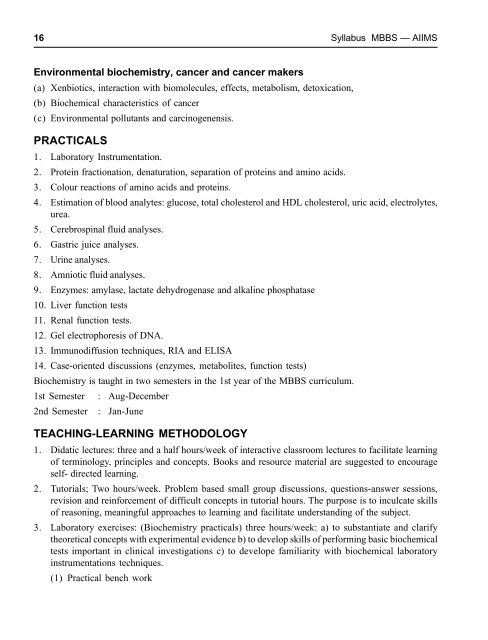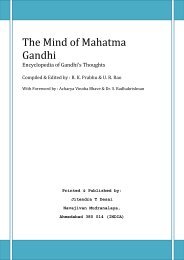Syllabus - MBBS
You also want an ePaper? Increase the reach of your titles
YUMPU automatically turns print PDFs into web optimized ePapers that Google loves.
16 <strong>Syllabus</strong> <strong>MBBS</strong> — AIIMS<br />
Environmental biochemistry, cancer and cancer makers<br />
(a) Xenbiotics, interaction with biomolecules, effects, metabolism, detoxication,<br />
(b) Biochemical characteristics of cancer<br />
(c) Environmental pollutants and carcinogenensis.<br />
PRACTICALS<br />
1. Laboratory Instrumentation.<br />
2. Protein fractionation, denaturation, separation of proteins and amino acids.<br />
3. Colour reactions of amino acids and proteins.<br />
4. Estimation of blood analytes: glucose, total cholesterol and HDL cholesterol, uric acid, electrolytes,<br />
urea.<br />
5. Cerebrospinal fluid analyses.<br />
6. Gastric juice analyses.<br />
7. Urine analyses.<br />
8. Amniotic fluid analyses.<br />
9. Enzymes: amylase, lactate dehydrogenase and alkaline phosphatase<br />
10. Liver function tests<br />
11. Renal function tests.<br />
12. Gel electrophoresis of DNA.<br />
13. Immunodiffusion techniques, RIA and ELISA<br />
14. Case-oriented discussions (enzymes, metabolites, function tests)<br />
Biochemistry is taught in two semesters in the 1st year of the <strong>MBBS</strong> curriculum.<br />
1st Semester : Aug-December<br />
2nd Semester : Jan-June<br />
TEACHING-LEARNING METHODOLOGY<br />
1. Didatic lectures: three and a half hours/week of interactive classroom lectures to facilitate learning<br />
of terminology, principles and concepts. Books and resource material are suggested to encourage<br />
self- directed learning.<br />
2. Tutorials; Two hours/week. Problem based small group discussions, questions-answer sessions,<br />
revision and reinforcement of difficult concepts in tutorial hours. The purpose is to inculcate skills<br />
of reasoning, meaningful approaches to learning and facilitate understanding of the subject.<br />
3. Laboratory exercises: (Biochemistry practicals) three hours/week: a) to substantiate and clarify<br />
theoretical concepts with experimental evidence b) to develop skills of performing basic biochemical<br />
tests important in clinical investigations c) to develope familiarity with biochemical laboratory<br />
instrumentations techniques.<br />
(1) Practical bench work



